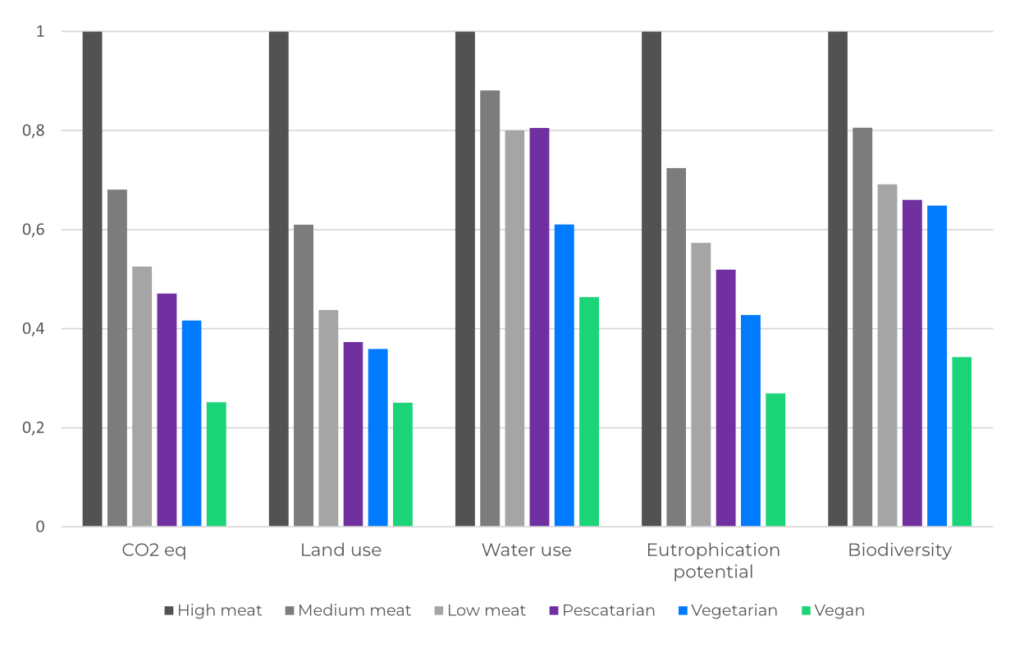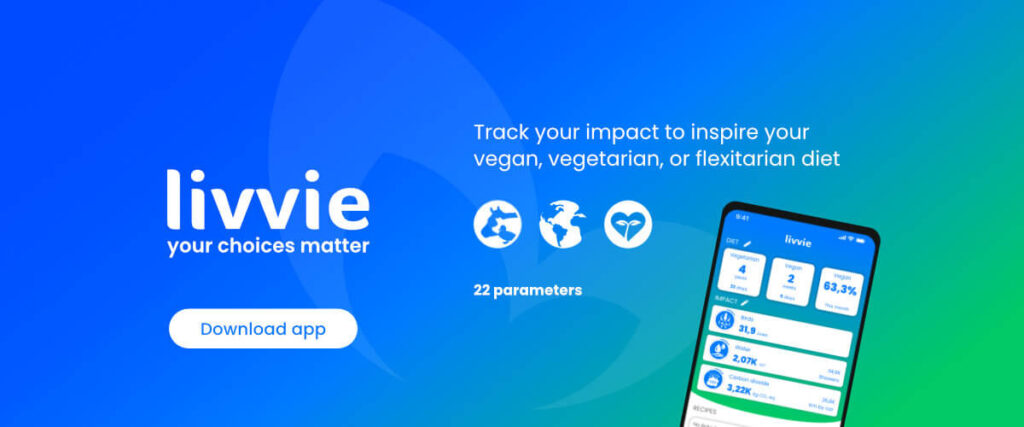Vegan Initiatives Are Good for Business and Your ESG Goals
Published 22 December 2023
More than ever, people are aware of the impact of their consumption behaviours on the environment, their health, and society. And they prefer to associate with companies that align with their values. As a business, you can attract and retain both customers and employees by aligning your business activities with Environmental, Social, and Governance (ESG) principles.
Initiatives that promote a more plant-based food culture can contribute to your ESG goals in several ways. In this article, you will learn how vegan business initiatives lower your company’s environmental impact, drive inclusivity, and improve employee health. You will also learn about minor changes in your workplace that can make a substantial contribution to a healthier planet and community.

Easily calculate the positive impact of your vegan business initiatives
How Vegan Business Initiatives Contribute to Your ESG Goals
Consumers increasingly buy from businesses that align with their ethical and environmental values. They are even willing to pay more for products and services that are created in a sustainable and socially responsible manner.
The job market has also evolved, with new generations of employees looking for more than just a high salary. It is nowadays more challenging to find and keep top talent. Millennials and Gen Z are particularly drawn to job opportunities that allow them to make a positive impact.
By incorporating ESG principles into your operations, your company can attract and retain customers and talent, enhance brand reputation, and drive long-term growth. Business initiatives that promote a vegan food culture in and outside the workplace help advance multiple ESG goals by driving inclusivity, employee health, and sustainability.
1. Promote diversity and inclusivity
Food choices may be the most ingrained cultural and individual expression that people apply several times a day. With ever more international workforces and diet trends, it can be challenging to cater to everyone’s dietary preferences. Offering vegan food options can be a powerful tool for promoting inclusivity and a culture of respect and understanding for all employees.
Adapt to the protein transition
Across the globe, the number of people that embrace plant-based foods is growing. In Europe, 3% of people are vegan, 5% are vegetarian, and 4% are pescatarians who eat fish and shellfish, but no meat. On top of the people that have committed to those lifestyles, 27% of the population considers themself flexitarian and consciously reduce their meat intake. Even among meat-eaters, the consumption of plant-based food continues to rise. The European plant-based food market is projected to grow with 10,1% annually until 2029.
Accommodate diets of multicultural workforces
Some cultures present even higher numbers of vegetarians and vegans. For example, vegetarianism is naturally rooted in the Hinduist culture of India. Religion often has a significant impact on food culture, with specific rules related to the consumption and preparation of animal-based foods. Such as halal in Islamic culture and kosher in Jewish culture.
So, an extra benefit of offering vegan food options in the canteen is that it can accommodate the dietary needs of most cultures and religions. This ensures there is always a food option for everyone.

Prevent discrimination
Most vegans commit to their lifestyle due to ethical objections against the exploitation of animals in our food system. Veganism qualifies as a philosophical belief that warrants the same regard and sensitivity in the workplace as other beliefs and religions.
Since 2020, ethical veganism is explicitly protected in the United Kingdom under the 2010 Equality Act. This shields vegan employees from discrimination and unfair treatment.
Cater to food allergies and intolerances
Besides diet preferences, up to 10% of people have a food allergy, with milk, eggs, shellfish, and fish among the most prevalent allergies. Even more people suffer from food intolerances and 65% of people are lactose intolerant worldwide. So, for reasons of inclusivity as well as employee health, it is wise for business caterers to offer food options without those ingredients.
By offering vegan food options in the workplace, companies can show their commitment to inclusivity and cater to the dietary needs of a wider range of employees. This can help to attract and retain top talent and create a more welcoming and supportive work environment.
2. Improve employee health and wellbeing
Vegan initiatives can also significantly enhance employee health and wellbeing. Half of the people who decide to eat less meat and dairy are motivated by their health, both across Europe, USA, and Asia.
And rightfully so. Animal-based foods contribute to the biggest population health issues that burden families and society, including cardiovascular disease, type 2 diabetes, and several types of cancer. They generally contain high amounts of cholesterol, saturated fat, lactose, hormones, toxic pollutants, and pathogens that adversely impact health.
In contrast, plant-based diets are rich in vitamins, fiber, and antioxidants, and can lower the risk of chronic diseases such as heart disease, type 2 diabetes, and certain cancers. Unsurprisingly, higher plant-based food consumption and lower animal-based food consumption are associated with a lower risk of mortality.

By offering and promoting vegan options in the workplace, companies can encourage employees to adopt healthier eating habits. This can lead to improved physical and mental health and increased productivity of their workforce.
One of the biggest population health threats is antimicrobial resistance. Animal agriculture consumes 73% of all antibiotics and is a breeding ground for resistant microbes as well as novel zoonotic diseases that can cause pandemics. By taking corporate responsibility and avoiding meat and other animal-based foods you help protect society from these hazards.
3. Enhance company sustainability performance
Promoting vegetarian and vegan foods in and outside of the workplace helps lower the carbon footprint and environmental impact of a company significantly.
Our food system has a massive environmental footprint, with a disproportionately large contribution by animal agriculture, which produces only 18% of global calories. The high environmental impact of animal-based foods is the result of inefficient use of natural resources and excessive environmental pollution across the supply chain.
More efficient use of natural resources
Farm animals require a lot of feed that is wasted because only a small portion of calories is ultimately consumed by people. Calories that could have fed people directly to fight world hunger. Livestock feed production claims 43% of all cropland and grazing pastures use up 70% of agricultural land, all requiring large quantities of fresh water. This caloric inefficiency is why animal agriculture is a leading cause of water scarcity, soil degradation, deforestation, and biodiversity loss.
Less environmental pollution
Animal agriculture also causes excessive pollution and is a major contributor to climate change. Production of meat, dairy, eggs, and fish emits twice as much greenhouse gas as plant-based food production. Fossil fuels are burned during transportation and processing of feed crops into animal-based foods, emitting carbon dioxide. Feed crops are grown using pesticides and fertiliser, the main source of nitrous oxide and eutrophying emissions. Livestock also produce massive amounts of manure and emit 44% of human methane emissions.
Vegan food initiatives drive company sustainability
When eating plant-based food, you skip many processing steps across the supply chain, avoiding waste and pollution. That is how vegetarian and vegan diets require far less land, water, and energy to produce than animal-based diets. By eating vegan, you can even reduce the environmental impact of your diet up to 75%.

The environmental impact of a vegan, vegetarian, pescatarian, low meat, medium meat, and high meat diet. Data is displayed as relative carbon dioxide emissions (CO2 eq), land use, water use, eutrophication potential, and biodiversity compared to a high meat diet. Adapted from Scarborough et al., 2023.
Companies can play a key role in mitigating the detrimental effects of our food system on the environment. By offering more sustainable, vegan food options in the company restaurant, businesses directly lower their carbon footprint and contribute to a sustainable future. Investing in employee knowledge helps grow awareness on the environmental benefits of a vegan diet in the broader community. Embracing a vegan food culture and critically reviewing supply chains and business activities also sets a positive example for corporate culture.
Initiatives to Create a Vegan-Friendly Corporate Culture
Your company will benefit in several ways from transitioning to a more vegan-friendly food culture, but how can you drive such change?
Firstly, ensure buy-in from executives and relevant stakeholders. This will help to clear supporting resources and boost the visibility of your initiatives. You can get the attention of executives by emphasising how they contribute to ESG goals, including inclusivity, employee health, and sustainability. Make sure to agree on key performance indicators that you can measure, such as employee wellbeing and the positive environmental impact of your vegan initiative. Such insights can help stimulate participation of your colleagues and endorse new initiatives.
There are several organisations that provide great resources to support vegan business initiatives such as Veganuary and Vegan Leaders in Corporate Management. Below you can find an overview of initiatives that help grow awareness on the benefits of a vegetarian or vegan diet and expand food options.
1. Increase employee awareness on the benefits of a vegan diet
A crucial step in transitioning your company to a more plant-based culture is raising awareness among employees about the benefits of a vegan diet. By educating your coworkers about the health, environmental, and ethical advantages of vegan food, you can encourage them to embrace it. While supporting your company’s efforts to promote a sustainable and inclusive food culture.
Vegan challenges in the workplace
A collective vegan challenge is a great way to build a sense of community among employees. Veganuary is a global initiative that challenges people to adopt a vegan diet during January (or any other time). They provide great supporting resources, practical tips, and recipes for participants. They also offer specific support for companies with the Veganuary Workplace Challenge.
If a month is too demanding, you can also organise a vegan challenge week for employees. These challenges are not about your colleagues perfectly adhering to a vegan diet. Even reducing meat intake or eating vegetarian more often can make a significant impact for the environment, health, and animal welfare. By asking participants to track their diet, you can calculate the positive impact of your Veganuary or other vegan challenge.
Employee awareness campaigns
There are many other activities to increase employee awareness on the benefits of plant-based food. During a campaign, you can use internal communication channels to share informative articles or recipes. You can highlight the environmental, health, and ethical benefits of a vegetarian or vegan diet by inviting guest speakers. A plant-based cooking workshop or a team dinner helps showcase the culinary versatility and deliciousness of vegan cuisine.
These activities can also be used to support a vegan challenge as a comprehensive educational experience. By cultivating knowledge and understanding, you can empower employees to make informed decisions about their diets and encourage them to embrace vegan food.
2. Offer more vegetarian and vegan food options to employees
Increasing the availability of vegetarian and vegan options in the company restaurant is an essential step in promoting a more plant-based culture in the workplace. By showing the culinary diversity and flavor profiles of vegan cuisine, you can create a more inclusive and appealing food experience for all employees. This, in turn, can foster a greater acceptance and adoption of vegetarian and vegan diets within the company culture.
In most employee cafeterias there are vegetarian options available, but finding a nutritious vegan meal can be challenging. By providing a diverse and appealing selection of vegan dishes, you can encourage employees to explore and adopt these healthier and more sustainable food choices. Simply having more options can increase the sales of vegan meals, even among meat eaters. You can also organise a recurring event in the canteen such as a Meatless Monday. Consider all meal moments during the day, including breakfast, lunch, dinner, and snacks.
When arranging a business lunch or dinner with customers or employees, ensure there are vegan options. When eating out, find a restaurant that has plenty vegan options or consider going to a vegetarian or vegan restaurant.
Collaborate closely with your catering team or food service provider to not only expand the variety of vegetarian and vegan dishes on the menu, but also clearly label them. You can even measure the number of meals sold and track the positive impact of your vegan initiatives.

3. Review your product portfolio and business activities
Beyond promoting plant-based eating in the workplace, companies can also align their product portfolio and business activities with ESG principles. This can resonate with consumers who seek products and companies that share their environmental and ethical values, enhancing brand reputation and loyalty.
Companies in food service, manufacturing, and retail can explore opportunities to replace animal-based with plant-based ingredients and products. Veganising your food offerings can make them more accessible to a wider range of customers, unlocking new segments and revenue. So, do your products really need milk powder?
Beyond the food industry, other companies can replace animal-based materials such as leather or ensure no animal testing took place across their supply chain. Corporations can also take social action with their financial strategy by investing only in sustainable and ethical businesses and pension funds.
Vegan Initiatives Are Good for Business
Animal agriculture is a leading cause of the most urgent environmental issues we face, including climate change, deforestation, and loss of biodiversity. Unhealthy diets rich in meat and dairy also contribute to chronic diseases that affect families and society.
As a company, you can play a key role in growing awareness and reducing the environmental and societal damage caused by our food system. By promoting vegan initiatives in the workplace, you contribute to a healthier planet and community and create a more inclusive corporate culture.
Transitioning to more vegan food offerings also differentiates your business by demonstrating your commitment to ESG goals to customers, partners, and employees. This creates an opportunity to attract talent, drive customer loyalty, and unlock new market opportunities.
So, as a company employee or executive, you have the power to contribute to a sustainable, healthy future and you can start taking action today.
If you are interested in calculating the positive impact of your vegan business initiatives, you can contact us. You can also subscribe to stay updated on the upcoming release of our vegan food impact calculator for businesses.

Inspire your colleagues and executives by sharing this article.
Track Your Impact
Inspire your vegan business initiatives with easy impact data on 22 parameters.


